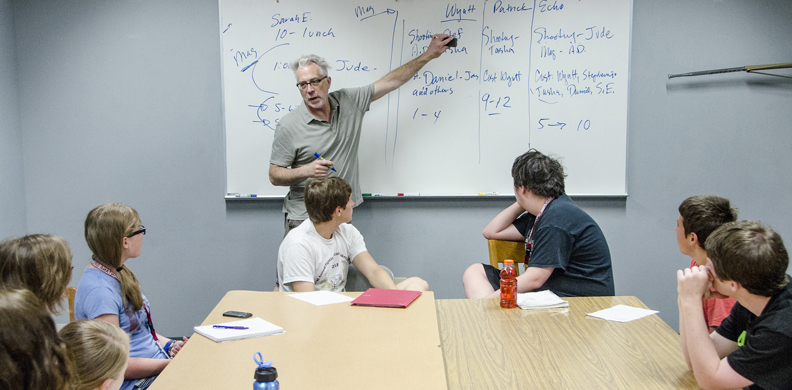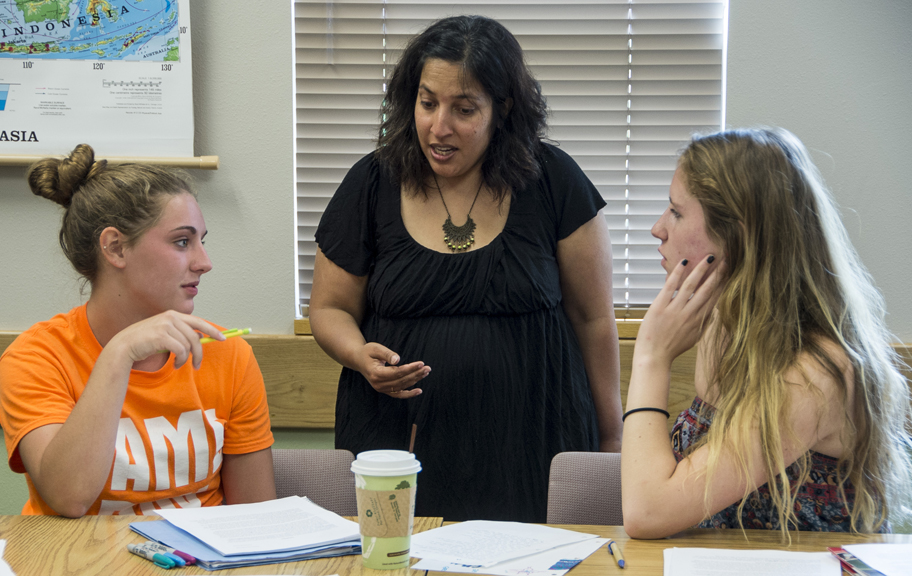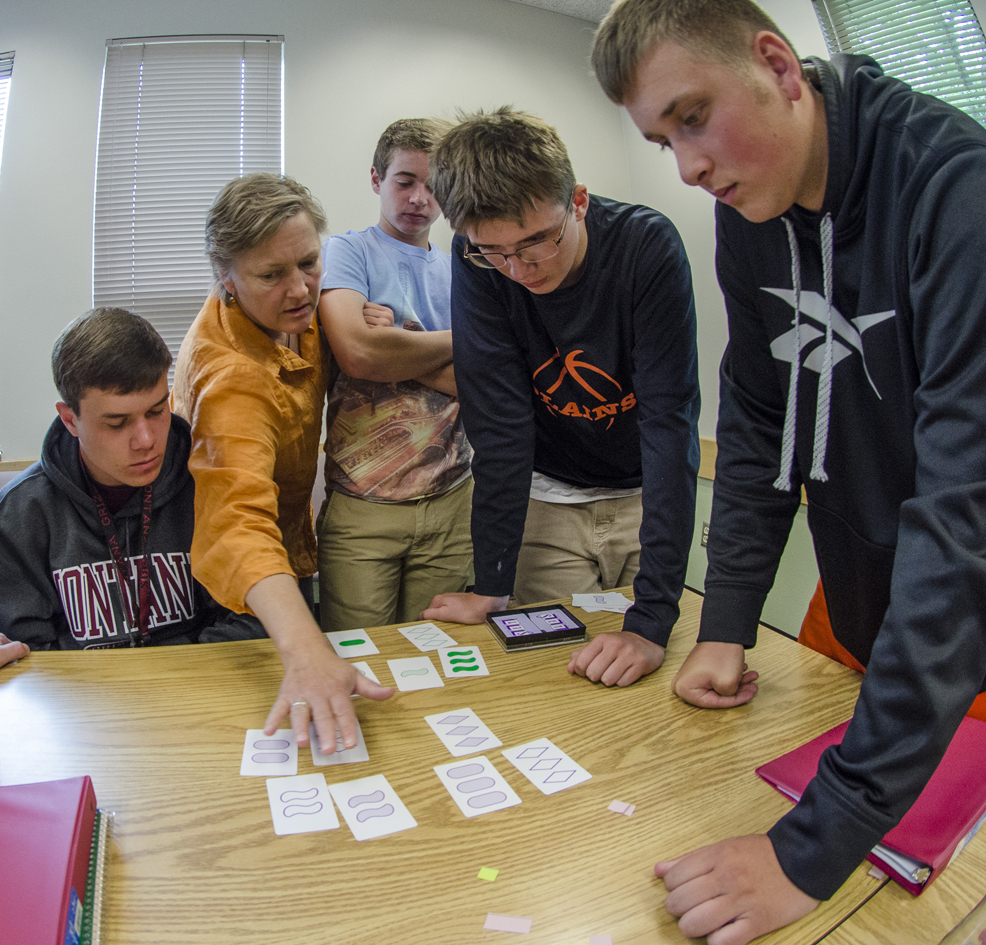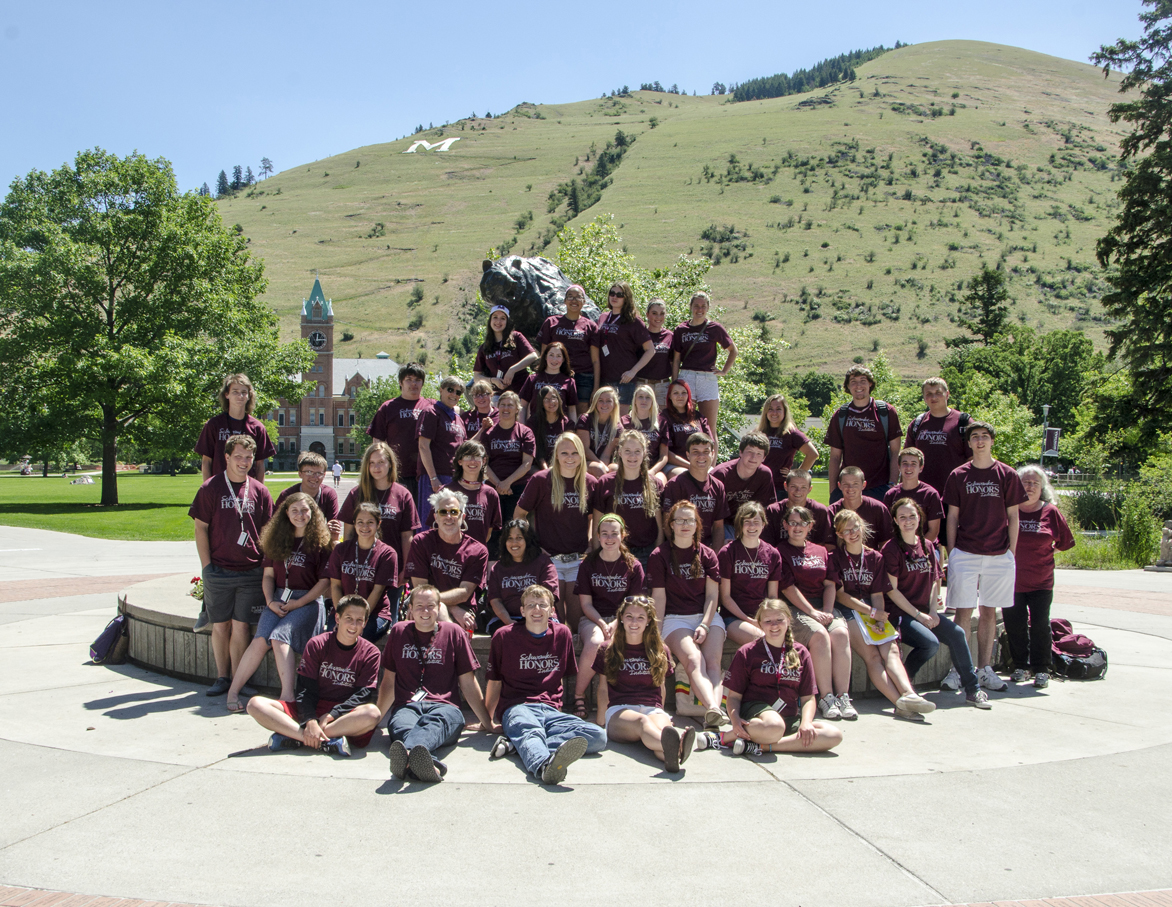- Editorial Offices
- 325 Brantly Hall
- Missoula, MT 59812
- (406) 243-2488
- themontanan@umontana.edu
- Icons By Maria Maldonado
High schoolers get taste of UM at Schwanke Institute





Marion DiVore came to UM’s 2014 Kermit and Kathleen Schwanke Honors Institute for high school students seeking a true college experience.
Sure, she lived on campus for two weeks, dined at the Food Zoo, and took in a sunset from the M. But it wasn’t until about a week into her stay that DiVore underwent the true rite of passage any UM student can relate to: pulling an all-nighter.
“I actually didn’t sleep last night,” says DiVore, a sixteen-year-old junior from Mountain Home, Idaho. “A group of us were up writing and helping each other with our projects. We read through each other’s stories and poems so many times.”
The institute, which began in 1988, brought nearly forty high school students from across the United States to Missoula for a two-week event in June. This year, a record thirteen participants were from out of state, including students from Vermont, North Carolina, California, Minnesota, and Idaho.
“It’s part college experience, part summer camp,” says Laure Pengelly Drake, who directs the program. “It’s a great way to get a sense of what college might be like and learn about UM, the Davidson Honors College, and Missoula.”
Course offerings vary each year, though a class in math or science and one in creative writing now are mainstays. The 2014 institute featured Introduction to Creative Writing, Discrete Mathematics, and Understanding and Making Movies. Students took one of the courses, which are taught by outstanding faculty members associated with the Davidson Honors College. Courses incorporated a hands-on approach designed to enhance learning and invite classroom interaction.
Like DiVore, Jordynn Paz, a fifteen-year-old from Hardin, enrolled in the creative writing course taught by UM Associate Professor Prageeta Sharma. Paz aspires to be a writer one day, and when her guidance counselor told her about the institute, she jumped at the opportunity to attend.
“The creative juices are really flowing here,” Paz says. “It’s a nice wake-up call to the college experience.”
Writing students were guided through the workshop process, critiqued each other’s poetry and short stories, then presented their favorite pieces at an evening event at the end of the institute. They also created an anthology of students’ work.
“Professor Sharma has us imitate different writing styles,” DiVore says. “It was irritating at first, but through the imitation we were able to really embrace different creative writing styles. Personally, I really enjoyed it because I’ve never done anything like it, and I have two English classes every year.”
Wyatt Campbell attended the institute to take Professor Michael Murphy’s film class. A Quentin Tarantino movie buff, Campbell wants to pursue making movies as a career.
“This is exactly what I want to do,” says Campbell, a sixteen-year-old junior from Darby. “UM is my top college choice right now, and they have a media arts program, so it’s worth my time to be here.”
Students in Murphy’s course studied film, and made and edited short movies. The class combined production techniques with viewing and analysis, and each student took turns acting, directing, writing, editing, and doing the physical crew work necessary to make a film happen.
“Professor Murphy is so cool,” Campbell says. “He’s really funny, and I love his hair. He’s inspirational, too, because you walk into his class and you see someone who’s actually made commercials and movies before. If you really listen to him, you can learn so much. I have. I mean, I learned how to edit on a whole new software program in a week. It blew me away how professional he is.”
The timing couldn’t have been better for the math students, as they participated in part of the Pacific Northwest Mathematics Association of America conference. They heard from the current president of the association, Robert L. Devaney, a professor of mathematics at Boston University, who presented Chaos Games and Fractal Images.
Taught by Jenny McNulty, associate dean of UM’s College of Humanities and Sciences and a mathematics professor, students learned to see and understand the discrete math problems that surround us in our daily lives, such scheduling buses and aircraft, designs of unbreakable codes, and the mathematics behind the game Instant Insanity.
Perhaps more important was their training in problem-solving techniques and dealing with the difficulties of math. They tried their hands at solving problems that professional mathematicians still have not solved.
“This isn’t like other math classes I’ve taken,” says Hayden Hughes, a sixteen-year-old junior from Murphy, N.C. “It’s much more difficult, much more of a challenge.”
“This is what it is like to be a mathematician,” McNulty says. “The answers aren’t in the back of the book.”
Many of the students are considering enrolling at UM in the future, and their experience at the institute pushed it onto their shortlist of higher education choices.
“I love everything about this campus,” says Patrick Marrinan, a senior from Morrisville, Verm., who took the movie making class. “I am looking at either film or physical therapy as a career, and UM has both of those programs.”
Along with all of the experiences gained at the institute, the students get two college credits for completing their respective courses.
“I didn’t know you got credit,” Campbell says. “I thought it was more of a summer camp. Then they told us we get credit for our work. It’s a good deal. I feel a little bit ahead now, like I have a jumpstart on my college career and a head start on everybody else.”
“The credits are just like Brownie points,” Paz says, “because the overall experience is what is important.”